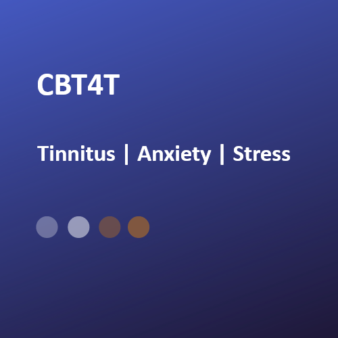James, Switzerland
Interim review written at first repeat stage (Stage 6), 8 weeks after enrolment
Tinnitus Functional Index (TFI) reduced from 69.6% (category 4: big problem) > 20.4% (category 2: small problem)
Q: Do you recommend others to use the CBT for Tinnitus E-Programme?
A: "Yes, absolutely. When I heard that there is nothing that can be done to treat tinnitus, it contributed to my sense of hopelessness. As CBT is apparently the only proven way to manage the condition, there is nothing to lose and everything to gain by pursuing this path. I was convinced of the robustness of Debbie`s approach after reading through the course information, especially in comparison to various apps and am strongly convinced signing up was the best course of action I could have taken. I committed myself to the protocol, despite initial reservations about how the breathing exercises could help the sound in my head and am happy to be in a significantly better place now as a result."
Q: What benefit have you experienced using the relaxation element of the course so far?
A: "The relaxation exercises have brought a calming routine to the day, whilst sometimes I struggle to fit them all in, I usually look forward to doing them now. Prior to the course, I wouldn’t have bought into the idea that something so apparently simple could help me, but I am pleased to say I have been proven wrong!"
Q: How has the neuroscience-based learning about the amygdala, autonomic ladder and brain plasticity helped you to relate to your experience of tinnitus, anxiety and stress?
A: "Yes - by de-mystifying and understanding the process behind tinnitus and distress, it has already helped me to shift my perception and move past my initial fear response."
Q: What have you learned from the costs & benefits transaction work (used from stage 3)? Estimate how much you have already adjusted from having a problem-oriented perspective towards a recovery-oriented perspective (e.g. 2/10 > 7/10 indicates an improvement of 5 so far)
A: "I have learned to recognize my regular negative thought process and to try to counter it with logic and evidence (where possible). It`s not always easy, as powerful emotions can come into play, but I am catastrophising less and recognizing where I have made progress more. I would say overall that I am now focusing primarily on recovery, but on bad days, it can slip back toward the problem viewpoint. The example of a shift from 2/10 to 7/10 is probably about right for me."
Q: You are likely to have had your first 1-1 by now. Did you benefit from your 1-1 and if so, how?
A: "Yes - simply having contact with someone who understands is already a big help, but Debbie was very calm and methodical in our discussion and I felt I could be very open about my experience and where I was at. I would definitely arrange another in due course to cover topics that I feel I could still deal better with."
Q: What is your own impression of your progress to date?
A: "When I initially signed up for the course, I was at a point of desperation, not knowing how I could go on with the tinnitus I was truly suffering from at the time and seeing my life as I knew it at an end. Now, after around 8 weeks, I feel I am coping day to day and living a fairly normal life in which I am often conscious of the tinnitus being present, but mostly consigned to the background and no longer being the centre of my attention. I have had some good days, when it feels like the tinnitus is almost non-existent, then bad ones when it re-appears without apparent explanation, but my response to the condition is very different to back at the start and I can generally deal with it and enjoy life. Importantly, at the start, I was having numerous sleepless nights, which made everything so much worse, but now I generally sleep soundly, with no need for a noise generator to mask the tinnitus, which has been a huge improvement."
